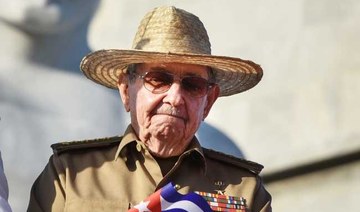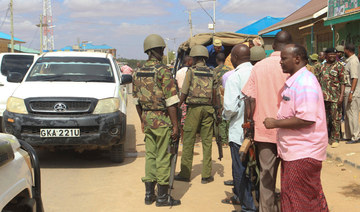WASHINGTON: The Trump administration on Tuesday ended the most popular forms of US travel to Cuba, banning cruise ships and a heavily used category of educational travel in an attempt to cut off cash to the island’s communist government.
Cruise travel from the US to Cuba began in May 2016 during President Barack Obama’s opening with the island. It has become the most popular form of US leisure travel to the island, bringing 142,721 people in the first four months of the year, a more than 300% increase over the same period last year. For travelers confused about the thicket of federal regulations governing travel to Cuba, cruises offered a simple, one-stop, guaranteed-legal way to travel.
That now appears to be over.
“Cruise ships as well as recreational and pleasure vessels are prohibited from departing the US on temporary sojourn to Cuba effective tomorrow,” the Commerce Department said in a statement to The Associated Press.
The new restrictions are part of a broader effort by the administration of President Donald Trump to roll back the Obama-era efforts to restore normal relations between the United States and Cuba, which drew sharp criticism from the more hard-line elements of the Cuban-American community and their allies in Congress.
Treasury said the sanctions would take effect on Wednesday after they are published in the Federal Register.
US national security adviser John Bolton, who declared Cuba part of a “troika of tyranny ” along with Nicaragua and Venezuela as he outlined plans for sanctions in November, said the new policy is intended to deny the Cuban government a vital source of revenue.
“The Administration has advanced the President’s Cuba policy by ending ‘veiled tourism’ to Cuba and imposing restrictions on vessels,” Bolton said on Twitter. “We will continue to take actions to restrict the Cuban regime’s access to US dollars.”
The Cuban government imposed food rationing last month as a result of tightened US sanctions and a drop in subsidized oil and other aid from Venezuela. For the Cuban government, cruise travel generated many millions of dollars a year in docking fees and payments for on-shore excursions, although those figures were never made public. Cuba also has become the most-requested destination for many South Florida-based cruise lines.
“The Trump administration deserves tremendous credit for holding accountable the Cuban regime,” Florida Republican Sen. Marco Rubio said. “The United States must use all tools available under US law to counter the Cuban regime’s deceitful activities to undermine US policy.”
The new restrictions take effect Wednesday, but the government said it will allow anyone who has already paid for the trip to go ahead with it. But the process going forward for passengers isn’t clear.
Cruise companies appeared to be caught off guard, with several, including Norwegian Cruise Lines and Royal Caribbean, urging ticketed passengers to be patient in response to queries on social media.
Finally, more than nine hours after the Treasury announcement, Royal Caribbean said it was canceling the Cuba stops on its June 5 and 6 cruises and would issue further guidance on future trips as soon as it was practical.
“We expect to know more within the next 24 hours and will communicate any changes as soon as we are able. In the meantime, we are adjusting the itineraries of our June 5 and June 6 sailings, which will no longer stop in Cuba. We are communicating with our guests about those changes,” Royal Caribbean said in a notice posted to its website.
Cruise lines carrying passengers booked before Tuesday had been hoping that they could request specific federal permits to complete their trips to Cuba, said Pedro Freyre, a Miami-based attorney who represents Carnival and three other major cruise lines.
“For now, it’s prohibited unless the cruise lines requests a specific license,” Freyre said. He said cruise lines had been trying to determine “if there’s any opening there to at least complete trips that have been booked and passengers that have made travel plans.”
Norwegian Cruise Line said in a statement that it was scrutinizing the new rules and consulting with lawyers and trade experts.
“We are closely monitoring these recent developments and any resulting impact to cruise travel to Cuba,” Norwegian Cruise Line said in a statement. “We will communicate to our guests and travel partners as additional information becomes available.”
Shore excursions from cruise ships tend to be organized by the cruise lines in cooperation with Cuban government tour agency Havanatur. A smaller number hire private tour guides or drivers of restored classic cars who wait outside Havana’s cruise docks.
“This affects all of us,” said William Mártinez, 58, a Cuban-born American who lived in Florida for 46 years but returned five years ago to drive a classic car for tourists. “It’s inhuman, the sanctions that they’re putting on Cuba.”
Treasury Secretary Steven Mnuchin said the measures are a response to what it calls Cuba’s “destabilizing role” in the Western Hemisphere, including support for the government of President Nicolas Maduro in Venezuela.
“This administration has made a strategic decision to reverse the loosening of sanctions and other restrictions on the Cuban regime,” Mnuchin said. “These actions will help to keep US dollars out of the hands of Cuban military, intelligence, and security services.”
Along with the cruise ships, the US will also now ban most private planes and boats from stopping in the island.
Cruises have become more popular than flights for leisure travelers to Cuba — nearly 30,000 more came by cruise ship than flights this year. The figures exclude Cuban-born Americans visiting family on the island.
“I’ve been dying to come to Cuba forever, to see the cars, the buildings,” said Maria Garcia, a 46-year-old teacher from Puerto Rico who arrived in Havana Tuesday morning on a Norwegian cruise line. “I could do it with this cruise ... Trump needs to understand that people should come to this country, to enjoy and get to know its culture, just like we would do in any other part of the world.”
Commercial airline flights appear to be unaffected by the new measures and travel for university groups, academic research, journalism and professional meetings will continue to be allowed.
Collin Laverty, head of Cuba Educational Travel, one of the largest Cuba travel companies in the US, called the new measures “political grandstanding aimed at Florida in the run up to the 2020 elections.”
“It’s also terrible for US companies that are providing employment and paying taxes in the US and creating an economic footprint on the island,” he said.
US moves to bar American tourists from visiting Cuba
US moves to bar American tourists from visiting Cuba
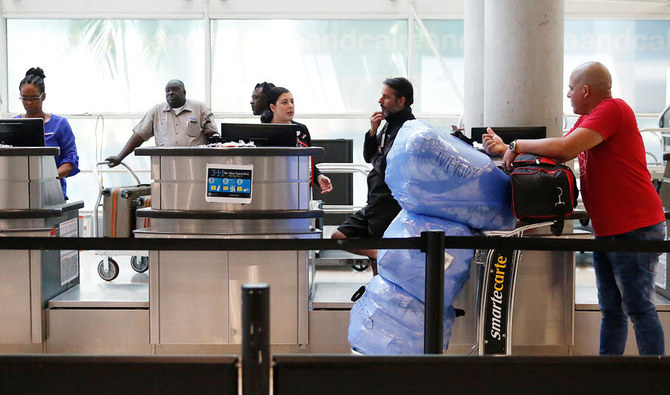
- White House National Security Advisor John Bolton said the aim was to end what the administration considers "veiled tourism" to Cuba
- Cuba and the US restored ties in 2015 and Obama himself visited Havana in a historic presidential trip in March 2016, meeting with then-president Raul Castro
Somalia detains US-trained commandos over theft of rations
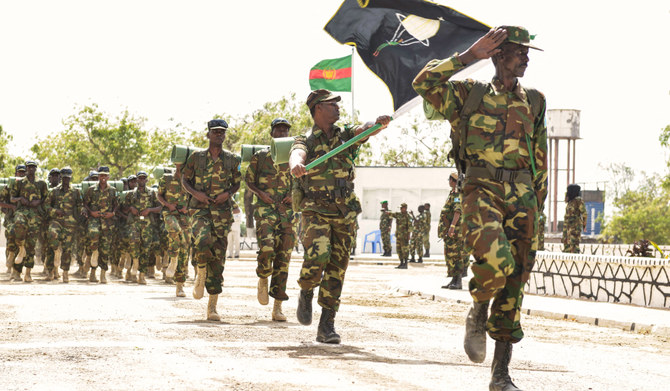
- The US agreed in 2017 to help train and equip the 3,000-strong Danab to act as a quick-reaction strike force against Al-Shabab
MOGADISHU: Somalia’s government said it had suspended and detained several members of an elite, US-trained commando unit for stealing rations donated by the US, adding that it was taking over responsibility for provisioning the force.
The Danab unit has been a key pillar of US-backed efforts to combat the Al-Qaeda-linked militant group Al-Shabab. The US agreed in February to spend more than $100 million to build up to five military bases for Danab.
Somalia’s Defense Ministry said in a statement that it had notified international partners of the theft and would share the outcome of its investigation.
A US official said in a statement to Reuters that Washington takes all corruption accusations seriously.
“We look forward to engaging with the Danab on creating the necessary safeguards and accountability measures to prevent future incidents that could affect future assistance,” the official said, without directly addressing whether any US support had already been suspended.
The US agreed in 2017 to help train and equip the 3,000-strong Danab to act as a quick-reaction strike force against Al-Shabab.
The group has been waging an insurgency against the central government since 2006.
Danab has been heavily involved in a military offensive by the Somali military and allied clan militias since 2022 that initially succeeded in wresting swaths of territory from Al-Shabab in central Somalia.
However, the campaign has lost momentum, with the government-allied forces struggling to hold rural areas and Al-Shabab continuing to stage large-scale attacks, including in the capital Mogadishu.
Washington suspended some defense assistance to Somalia in 2017 after the military could not account for food and fuel.
The US also conducts frequent drone strikes targeting Al-Shabab militants.
Kenya flood death toll since March climbs to 70

- Tanzania Prime Minister Kassim Majaliwa said on Thursday that more than 200,000 people had been affected by the disaster, with 155 fatalities and 236 people injured
NAIROBI: The number of people killed in floods in Kenya due to heavier than usual rainfall since the start of the monsoon in March has risen to 70, a government spokesperson said on Friday.
In recent weeks, Kenya and other countries in East Africa — a region highly vulnerable to climate change — have been pounded by heavier-than-usual rainfall compounded by the El Nino weather pattern.
El Nino is a naturally occurring climate pattern typically associated with increased heat worldwide, leading to drought in some parts of the world and heavy rains elsewhere.
BACKGROUND
Kenyans have been warned to stay on alert, with the forecast for more heavy rains across the country in the coming days as the monsoon batters East Africa.
“The official tally of fellow Kenyans who regrettably have lost their lives due to the flooding situation now stands at 70 lives,” government spokesperson Isaac Mwaura said on X after torrential rains killed more than a dozen people in the capital, Nairobi, this week.
Mwaura said the government would issue a “comprehensive brief” following a meeting with the national emergency response committee after the extreme weather caused chaos across Nairobi this week, blocking roads and engulfing homes in slum districts. Kenyans have been warned to stay on alert, with the forecast for more heavy rains across the country in the coming days as the monsoon batters East Africa.
At least 155 people have died in neighboring Tanzania due to flooding and landslides.
Tanzania Prime Minister Kassim Majaliwa said on Thursday that more than 200,000 people had been affected by the disaster, with 155 fatalities and 236 people injured.
He said homes, property, crops, and infrastructure such as roads, bridges, railways, and schools had been damaged or destroyed.
In Burundi, one of the poorest countries on the planet, around 96,000 people have been displaced by months of relentless rains, the United Nations and the government said this month.
Meanwhile, the UN humanitarian response agency, OCHA, said in an update this week that in Somalia, the seasonal Gu rains from April to June are intensifying, with flash floods reported since April 19.
It said four people had been reportedly killed and more than 800 people affected or displaced nationwide.
Uganda has also suffered heavy storms that have caused riverbanks to burst, with two fatalities confirmed and several hundred villagers displaced.
Late last year, more than 300 people died in torrential rains and floods in Kenya, Somalia, and Ethiopia, just as the region was trying to recover from its worst drought in four decades that left millions of people hungry.
From October 1997 to January 1998, massive flooding caused more than 6,000 deaths in five countries in the region.
Jewish campaign group led by Gideon Falter cancels London march over safety concerns

- The Campaign Against Antisemitism says safety concerns forced it to call off its “Walk Together” march after receiving threats from ‘hostile actors’
- Last weekend, a video appeared to show police prevent ‘openly Jewish’ Falter from walking near a pro-Palestine protest but a longer version of the footage painted a different picture
LONDON: The organizers of a march in protest against antisemitism, planned for Saturday in London, “reluctantly” announced on Friday that they were canceling the demonstration.
The Campaign Against Antisemitism said it was forced by safety concerns to call off its “Walk Together” march, which was scheduled to coincide with the latest in a series of pro-Palestine marches in the British capital. The organization said it had expected thousands of people to take part but threats from “hostile actors” posed a safety risk.
“We have received numerous threats and our monitoring has identified hostile actors who seem to have intended to come to any meeting locations that we announced,” the CAA said.
“The risk to the safety of those who wished to walk openly as Jews in London tomorrow as part of this initiative has therefore become too great.
“We are no less angry about these marches than our Jewish community and its allies. We want to walk.”
The group added that it wants the Metropolitan Police not only to “manage marches” but “police” them.
Last weekend, a video that circulated on social media sparked controversy as it showed a confrontation between the CAA’s chief executive, Gideon Falter, and a Metropolitan Police officer who appeared to be preventing him from crossing the road in the vicinity of a pro-Palestine march in London because he was “openly Jewish” and his presence was “antagonizing.”
Falter, who was threatened with arrest if he did not leave the area, criticized the police for their actions during the incident and claimed there were now “no-go zones for Jews” in London amid a rise in antisemitic sentiment arising from Israel’s war on Gaza following the Oct. 7 attacks by Hamas.
Police chiefs apologized twice for the officer’s choice of words. However, a former senior police officer said on Monday that the initial, short version of the video most people saw online “did not fully represent the situation.”
A longer version showed the officer expressing concern about Falter’s actions because he appeared to be deliberately attempting to provoke the pro-Palestinian demonstrators.
Berlin police clear pro-Palestinian camp from parliament lawn

- Police dismantled tents, forcibly removed protesters and blocked the surrounding area to stop others arriving
- "The idea was to draw attention to that and ... to the German complicity and active enabling of the Israeli genocide in Gaza," the camp organizer, Jara Nassar, said
BERLIN: Berlin police on Friday began clearing a pro-Palestinian camp set up in front of the German parliament by activists demanding the government stop arms exports to Israel and end what they say is the criminalization of the Palestinian solidarity movement.
Police dismantled tents, forcibly removed protesters and blocked the surrounding area to stop others arriving.
The action followed clashes between demonstrators and police on US campuses and a blockade at Paris’s Sciences Po university, part of international protests to decry Israel’s military campaign in Gaza and Western support for Israel.
The Berlin camp ‘Besetzung Gegen Besatzung’ — ‘Occupy Against Occupation’ — began on April 8, coinciding with the start of International Court of Justice hearings in Nicaragua’s case against Germany for providing military aid to Israel.
“The idea was to draw attention to that and ... to the German complicity and active enabling of the Israeli genocide in Gaza,” the camp organizer, Jara Nassar, told Reuters.
Israel strongly denies accusations that its offensive in Gaza, which aims to destroy the Palestinian militant group Hamas, constitutes a genocide.
Nassar and a dozen protesters sat on the ground, chanting pro-Palestinian slogans and songs as police with loudspeakers called on them to leave.
“We look at what is happening in the US ... with admiration. There is no reason to believe we should stop now,” said Udi Raz, a PhD student at Berlin’s Free University and a member of the Jewish Voice association.
Raz, who wore a Jewish kippah with the Palestinian flag colors and held his phone in a live social media broadcast of the clearance, said Jewish activists had joined the camp and held a candle-lit Passover dinner there this week.
Police said the prohibition order for the camp, which had been granted authorization at the start of the protest, was due to repeated violations committed by some protesters, including the use of unconstitutional symbols and forbidden slogans.
“Protection of gatherings cannot be guaranteed at this point because public safety and order are significantly at risk,” police spokesperson Anja Dierschkesaid said, adding tents had to be moved daily under local regulations to maintain the lawn.
“For the German government, grass matters more than the lives of more than 40,000 innocent people in Gaza murdered by the Israeli military,” Raz said.
Philippine police kill an Abu Sayyaf militant implicated in 15 beheadings and other atrocities
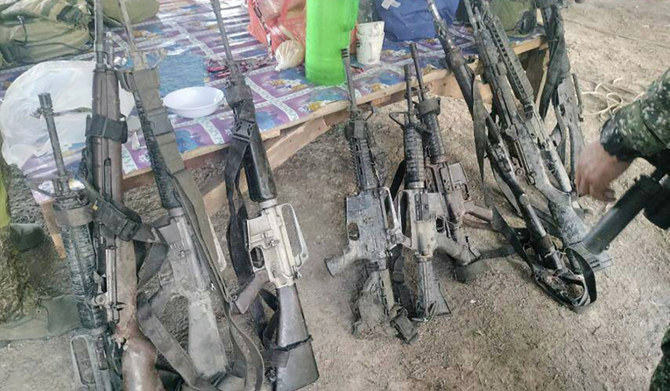
- A confidential police report said that Abdulsaid had been implicated in at least 15 beheadings in Basilan, including of 10 Philippine marines in Al-Barka town in 2007 and two of six kidnapped Vietnamese sailors near Sumisip town in 2016
MANILA: Philippine forces killed an Abu Sayyaf militant, who had been implicated in past beheadings, including of 10 Filipino marines and two kidnapped Vietnamese, in a clash in the south, police officials said Friday.
Philippine police, backed by military intelligence agents, killed Nawapi Abdulsaid in a brief gunbattle Wednesday night in the remote coastal town of Hadji Mohammad Ajul on Basilan island after weeks of surveillance, security officials said.
Abu Sayyaf is a small but violent armed Muslim group, which has been blacklisted by the US and the Philippines as a terrorist organization for ransom kidnappings, beheadings, bombings and other bloody attacks. It has been considerably weakened by battle setbacks, surrenders and infighting, but remains a security threat particularly in the southern Philippines, home to minority Muslims in the predominantly Roman Catholic nation.
Abdulsaid, who used the nom de guerre Khatan, was one of several Abu Sayyaf militants who aligned themselves with the Daesh group.
A confidential police report said that Abdulsaid had been implicated in at least 15 beheadings in Basilan, including of 10 Philippine marines in Al-Barka town in 2007 and two of six kidnapped Vietnamese sailors near Sumisip town in 2016. The Vietnamese were seized from a passing cargo ship.
He was also involved in attacks against government forces in 2022 and a bombing in November that killed two pro-government militiamen and wounded two others in Basilan, the report said.
Abdulsaid was placed under surveillance in February, but police forces couldn’t immediately move to make a arrest because of the “hostile nature” of the area where he was eventually gunned down, according to the report.
On Monday, Philippine troops killed the leader of another Muslim rebel group and 11 of his men blamed for past bombings and extortion in a separate clash in a marshy hinterland in Datu Saudi Ampatuan town in southern Maguindanao del Sur province, the military said.
Seven soldiers were wounded in the clash with the members of the Bangsamoro Islamic Freedom Fighters.
The Abu Sayyaf and the Bangsamoro Islamic Freedom Fighters are among a few small armed groups still struggling to wage a separatist uprising in the southern Philippines.
The largest armed separatist group, the Moro Islamic Liberation Front, signed a 2014 peace pact with the government that eased decades of sporadic fighting.
Moro Islamic Liberation Front rebel commanders became parliamentarians and administrators of a five-province Muslim autonomous region in a transition arrangement after signing the peace deal. They are preparing for a regular election scheduled for next year.



